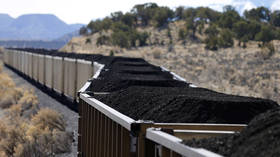Russia is ready to boost coal & gas supplies to China, but says problems with transportation remain

Beijing has been in talks with Moscow on increasing fossil fuel deliveries to China. However, despite Russia’s readiness to cooperate, transportation problems may hinder the efforts, the Russian ambassador to China says.
“The Chinese economy is quite rapidly recovering from the [Covid-19] pandemic crisis [but] there are certain imbalances that no one hides here. And, according to the forecasts that we see in the open press, ahead lies a cold winter; the northeast, which is closer to us, may well face a certain deficit. For this reason, yes, they really ask us to consider the possibility of increasing supplies. We are, of course, ready,” Russian Ambassador to China Andrey Denisov told journalists this week.
Also on rt.com India to stockpile gas & coal to avoid future energy crunch“In addition to coal, we [have] a new product that emerged last year – natural gas. Last year we supplied it in a trial mode through the Power of Siberia gas pipeline, bringing the supply to about 5 billion cubic meters. This year we planned to increase it to 10 billion cubic meters, since we cannot bring everything to full capacity yet,” Denisov said. He noted that although the Russian authorities have greenlighted the boost in deliveries, certain issues remain.
“This is not so much a government issue as a question of companies – mining and transporting companies. Certain difficulties we have are not so much in volumes, but in transport capabilities and equipment of border crossings,” he said.
The official explained that there are significant problems in the cross-border road transportation of goods due to the tightening of sanitary and epidemiological controls: Before the pandemic, 120 vehicles at a time were allowed to pass through the border crossings, but now only 40.
Also on rt.com China’s сoal and power crisis hits global economyDenisov noted that the newly-built Blagoveshchensk-Heihe cross-border road bridge and the railway bridge at the Nizhneleninskoye-Tongjiang border crossing could significantly ease the delivery process. However, neither bridge crossing has been launched yet.
“Both sides – both the Chinese and ours – are now thinking about how to organize the launch of these two bridge crossings. The railway bridge would probably help a lot in the coal business,” Denisov stated.
Authorities of several provinces in China, mainly in the northeast of the country, have been trying since mid-September to cope with interruptions in electricity and heating which have arisen due to shortages and the high cost of coal, as well as rising prices for natural gas. To avoid power outages, 20 provinces in China imposed restrictions on electricity consumption last month, both for industrial enterprises and households. As a result, China has been trying to stabilize the situation by increasing fossil fuel imports. In September alone, the import of coal rose by 76% in annual terms, amounting to 32.88 million tons.
For more stories on economy & finance visit RT's business section














